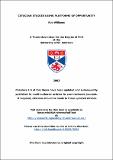Cetacean studies using platforms of opportunity
Abstract
As human impact on marine ecosystems continues to grow, so too does the need for
sound conservation and management strategies that are informed by science.
Cetaceans, the whales, dolphins and porpoises, epitomise this challenge, because they
are hard to study, they have been heavily exploited in the past, and because some of
their habitats, behaviours and life-history strategies make them acutely vulnerable to
human activities. Unfortunately, research on free-ranging cetaceans in remote areas is
costly, and financial resources are limited.
The approach used in this thesis to acquire inexpensive quantitative information on
cetacean populations and behaviour was to seek out platforms of opportunity.
Tourism and environmental education projects provided access to remote areas of
importance to cetaceans. The topic was explored in two main areas. First, studies
were conducted to investigate the use of ships of opportunity in estimating distribution
and abundance, namely of Antarctic baleen whales. The second area of interest was
the effect of boats on killer whales in the northeast Pacific.
Platforms of opportunity proved valuable for collecting data to model the role of
measurement error on abundance estimation. Measurement error was found to be a
potential source of bias in four distance estimation experiments. Platforms of
opportunity could be used to train observers on protocols, and to learn to use range-
finding photogrammetric equipment well before conducting dedicated surveys, which
would eliminate this source of bias, as well as estimating abundance in some cases.
Abundance and distribution of three whale species were modelled using data collected
aboard Antarctic tourist ships. Spatial modelling techniques were used to model
distribution of minke, fin and humpback whales using line-transect data collected from
a survey that could not be randomised. Strong gradients in animal density were
predicted, which could be used to inform future surveys. In the meantime, rough
estimates of abundance were obtained, and this approach shows promise for other
areas where lack of resources makes systematic surveys prohibitively expensive.
A government-funded environmental education project provided logistical support for
two studies that dealt with effects of boats on killer whale behaviour. One quantified
the extent to which a particular style of whalewatching was disruptive to whale
behaviour, and commercial whalewatchers agreed to halt this activity. The other
found that a protected area conferred benefit to killer whales, even though it protects
only a fraction of the whales' habitat for a fraction of the year.
The thesis contains four case studies that illustrate how inexpensive methods may be
used to obtain practical quantitative information to aid decision-making about
conservation and management of wild cetaceans that interact with (i.e.,
whalewatching), compete with (i.e., fishing) or are exploited by (i.e., whaling)
humans.
Type
Thesis, PhD Doctor of Philosophy
Description
Chapters 1-5 of this thesis have been updated and subsequently published in multi-authored articles in peer-reviewed journals. If required, citations should be made to these updated articles listed in the full item record belowCollections
Items in the St Andrews Research Repository are protected by copyright, with all rights reserved, unless otherwise indicated.

